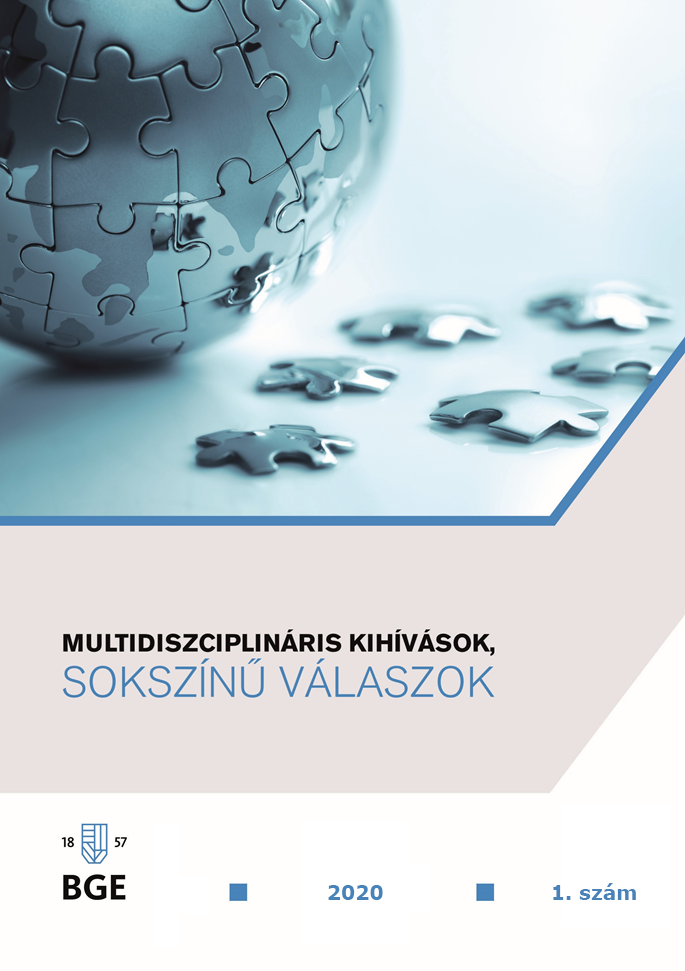A LEGFIATALABB GENERÁCIÓK A MUNKAHELYEKEN (SZLOVÁKIÁBAN)
Absztrakt
Napjainkban a generációk közötti hasonlóságok és különbségek vizsgálata fontos kutatási téma a menedzsment oldaláról. Jelen kutatás célja, hogy az azonos és eltérő jellemzőket feltárja a legfiatalabb generációk között és megválaszolja a kérdést, hogy a munkáltatók miképpen tudják a hasznukra fordítani az eltérő sajátosságokat. A kvantitatív vizsgálatok kérdőíves felmérés segítségével 2017 - 2018-ban zajlottak két szomszédos országban, Magyarországon és Szlovákiában. Bár a felmérés nem reprezentatív, de egy átfogó képet ad a munkavállalók véleményéről az adott kérdést illetően. Jelen tanulmány a szlovák eredményeket mutatja be, amely szerint a válaszadók kihívásnak értékelik a generációk közötti együttműködést és szervezeti munkát, amely nemcsak számukra, de a HR számára is számos feladatot ad és követelményt támaszt. Az új generáció megjelenése a munkaerőpiacon azt mutatja, hogy más HR eszközökkel kell a fiatalokat megközelíteni és lojálissá tenni a cégükhöz. Erős bennük a karrier, az önmegvalósítás iránti vágy, amely egyik gyakori oka, hogy nem lojálisak a szervezethez és hamar továbbállnak, ha az érdekeik úgy kívánják. A bérközpontú megközelítés ezeknek a munkavállalóknak már nem lesz elegendő, hogy tartós és aktív munkavállalói legyenek egy szervezetnek. Olyan új HR megoldásokat kell kidolgozni, mint az aktív karriermenedzsment, a generációs tudásmenedzsment, a családbarát politika, stb., hogy a cégek magukhoz vonzzák, megtartsák a fiatalokat és kezelni tudják a korosztályok között fellépő konfliktus helyzeteket a munkahelyeken.
Hivatkozások
ASHRAF,R. (2018): Multigenerational Employees: Strategies for Effective Management. International Journal of Economics and Management Science, 7 (3), https://doi.org/10.4172/2162-6359.1000528
BARAN,M.–KŁOS,M.(2014): “Managing an intergenerational workforce as a factor of company competitiveness”,Journal of International Studies, Vol. 7, No 1, 2014, pp. 94-101. https://doi.org/10.14254/2071-8330.2014/7-1
BARRY,P.H.(2011): The impact of generational differences on the workplace. Journal of Corporate Real Estate, 13(2), pp. 98-108. https://doi.org/10.1108/14630011111136812
BECTON,J.B.–WALKER,H.J.–JONES-FARMER,A. (2014): Generational differences in workplace behavior. Journal of Applied Social Psychology, 44(3), pp175-189. https://doi.org/10.1111/jasp.12208
BENCSIK A.–HORVÁTH-CSIKÓS G.&JUHÁSZT. (2016): Y and Z Generations at Workplaces. Journal of Competitiveness, 8(3), pp. 90 –106. https://doi.org/10.7441/joc.2016.03.06
BENCSIK A.–HORVATH-CSIKÓS G.&JUHÁSZT. (2017): Az Y és a Z generációval szembeni előítéletek a munkahelyen. Taylor 9.évf. 1.sz. pp. 121-128.
BERK,L.E. (2009): Child Development (8th ed). Boston: Allyn & Bacon/Pearson EducationBOITNOTT,J. (2016): Generation Z and the workplace: What you need to know. Inc. January27. Retrieved from http://www.inc.com/john-boitnott/generation-z-and-the-workplacewhat-you-need-to-know-.html
Center for Women and Business at Bentley University, (2017): Multi-Generational Impacts on the Workplace, BENTLEY UNIVERSITY , Waltham, USA
ČIČ,Z.V.–ZIZEK,S.S.(2017): Intergenerational Cooperation at the Workplace from the Managemen Perspective, Naše Gospodarstvo our Economy September 2017. Vol. 63. No. 3. pp. 47–59. https://doi.org/10.1515/ngoe-2017-0018
COSTANZA,D.P.–FINKELSTEIN,L.M.(2015): Generationally based differences in the workplace:Is there a there there? Industrial and Organizational Psychology, 8(3), pp.308-323.Deloitte. The 2017 Deloitte Millennial Survey. (2017) https://doi.org/10.1017/iop.2015.15
FERINCZ,A.–SZABÓ ZS. (2012): Z generáció hatása a munkáltató szervezetekre. Munkaügyi szemle. LVI. évf. 2. sz. pp. 88-92.
FESTING,M.–SCHAFER,L. (2014): Generational challenges to talent management: Aframework for talent retention based on the psychological contract perspective. Journal of World Business, 49(2), pp. 262-271. https://doi.org/10.1016/j.jwb.2013.11.010
GIBSON,J.W.–GREENWOOD,R.A. - MURPHY E.F.(2009): Generational Differences in the Workplace: Personal Values, Behaviors, and Popular Beliefs. Journal of Diversity Management, 4 (3), pp. 1-7. https://doi.org/10.19030/jdm.v4i3.4959
GONDA,N.(2015): A különböző generációk motivációs eszközeinek vizsgálata. Budapest OTDK dolgozat
GUHA,A.(2010): Motivators and hygiene factors of Generation X and Generation Y-the test of two-factor theory. Vilakshan: The XIMB Journal Of Management, 7(2), pp. 121-132.
HARVEY,M.–MCINTYRE N.–HEAMES J.T.&MOELLERR M. (2009): Mentoring Global Female Managers in the Global Marketplace: Traditional, Reverse and Reciprocal Mentoring. The International Journal of Human Resource Management, Vol. 20. No. 6. June 2009. pp. 1344-1361. https://doi.org/10.1080/09585190902909863
JOHNSON,J.M.–NG,E.S.(2015): Money talks or millennials walk the effect of compensation on nonprofit millennial workers sector-switching intentions. Review of Public Personnel Administration. https://doi.org/10.1177/0734371X15587980
JONES,L.M.(2017): “Strategies for Retaining a Multigenerational Workforce.” Journal of Business and Financial Affairs, 6:2.
KAIFI,B.A.–NAFEI,W.A.–KHANFAR,N.M.&KAIFI,M.M. (2012): A multi-generational workforce: managing and understanding millennials. International Journal of Business & Management, 7(24), pp.88-93. https://doi.org/10.5539/ijbm.v7n24p88
KHALID,S.A.–MDNOR,M.N.–ISMAIL,M.&MOHD RAZALIM. F. (2013): Organizational Citizenship and Generation Y Turnover Intention. International Journal of Academic Research in Business and Social Sciences, 3 (7), pp.132-141. https://doi.org/10.6007/ijarems/v2-i4/104
KRAHN,H.J.–GALAMBOS,N.L. (2014): Work values and beliefs of ‘Generation X’ and ‘Generation Y’. Journal of Youth Studies, 17(1), pp. 92-112. https://doi.org/10.1080/13676261.2013.815701
LYONS,S.–URICK,M.–KURON,L.,&SCHWEITZER,L. (2015): Generational differences in the workplace: There is complexity beyond the stereotypes. Industrial and Organizational Psychology, 8(3), pp. 346-356. https://doi.org/10.1017/iop.2015.48
LYONS,S.T.–SCHWEITZER,L.,&NG,E.S. (2015): How have careers changed? An investigation of changing career patterns across four generations. Journal of Managerial Psychology, 30(1), pp. 8-21. https://doi.org/10.1108/jmp-07-2014-0210
MORA,A. I. (2015): Capturing the best skills to generate and inspire the multigenerational workforce. Journal of Business & Management Studies, 1(2), pp. 1-9. https://doi.org/10.4018/978-1-7998-0437-6
NG,E.S.–MCGINNIS JOHNSON, J. (2015): Millennials: Who are they, how are they different, and why should we care. In The multigenerational workforce: Challenges and opportunities for organisations (pp. 121-137). Cheltenham, UK: Edward Elgar Publishing.
NG,E.S.–PARRY,E.(2016): Multigenerational Research in Human Resource Management Research in Personnel and Human Resources Management, Volume 34, pp. 1-41. https://doi.org/10.1108/s0742-730120160000034008
REZA,A.–SARRAF,A.(2019): Managing Multigenerational Organizations, Economic Alternatives, 2019, Issue 1, pp. 93-105. SCHAFFER,B. (2015): A legifjabb titánok, Book Kiadó, Budapest
SCHAFFER,B.(2012): Ifjú titánok, Könyvműhely Kiadó, Budapest
SMITH,J.W.–CLURMAN,A. (1998): Rocking the Ages: The Yankelovich Report on Generational Marketing, HarperBusiness, New York
SMOLA,K.W.–SUTTON,C.D. (2002): Generational differences: Revisiting generational work values for the new millennium. Journal of Organizational Behavior, 23, pp. 363–382. https://doi.org/10.1002/job.147
STURT,D.–NORDSTROM:(2016): Generational Differences: When They Matter, and When They Don’t. Forbes, 16 August 2016.
TARI,A.(2010): Y generáció, Jaffa Kiadó, Budapest
TARI,A.(2011): Z generáció Tericum Kiadó Kft., Budapest
TRAVIS J.–SMITH,T.N. (2015): Understanding the Millennial Generation, Journal of Business Diversity Vol. 15(1) 2015
TWENGE,J.–CAMPBELL,S.–HOFFMAN,B.&LANCE, C. (2010): Generational Differences in Work Values: Leisure and Extrinsic Values Increasing, Social and Intrinsic Values Decreasing. Journal of Management, 36 (5), pp. 1117-1142.
TWENGE,J.(2010): A review of the empirical evidence on generational differences in work attitudes. Journal of Business Psychology, 25, pp. 201-210.
WEEKS,K.P.(2017): Every Generation Wants Meaningful Work -but Thinks Other Age Groups Are in it for the Money. Harvard Business Review, 31 July 2017
WILLIAMS,J.(2016): 2016 Trends inthe Workplace, Arcadis,
WONG,M.–GARDINER,E.–LANG,W.&COULON, L. (2008): Generational differences in personality and motivation: Do they exist and what are the implications for the workplace? Journal of Managerial Psychology, 23 (8), pp. 878–890. https://doi.org/10.1108/02683940810904376


























